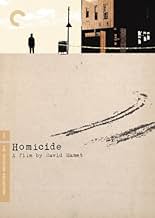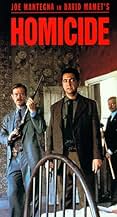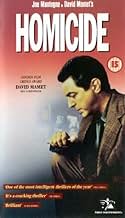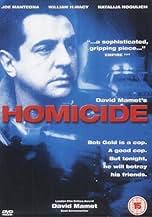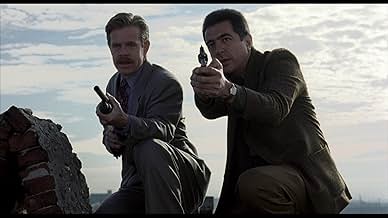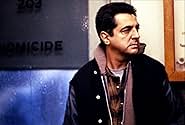Homicide
- 1991
- Tous publics
- 1h 42min
NOTE IMDb
6,9/10
8,5 k
MA NOTE
Ajouter une intrigue dans votre langueA Jewish homicide detective investigates a seemingly minor murder and falls in with a Zionist group as a result.A Jewish homicide detective investigates a seemingly minor murder and falls in with a Zionist group as a result.A Jewish homicide detective investigates a seemingly minor murder and falls in with a Zionist group as a result.
- Récompenses
- 3 victoires et 6 nominations au total
Histoire
Le saviez-vous
- AnecdotesThe film began as an adaptation of David Mamet's friend William J. Caunitz's 1986 novel "Suspects". However, the more Mamet wrote, the more his story diverged from the source material until, with Caunitz's blessing, Mamet left the source book behind entirely, until ultimately the script became an original screenplay.
- GaffesWhen Detective Gold discovers the photo behind the picture, in the picture is a Hebrew sign referring to a road being built by the Labor Federation's (haHistadrut) Solel Boneh division. In the sign it's misspelled "Vistadrut - Solel Bono".
- Citations
Tim Sullivan: Bob, I'm gonna tell you what the old whore said, and this is the truest thing I know: "When you start cumming with the customers, it's time to quit."
Commentaire à la une
I found the film as riveting and disturbing as most of the other reviewers, but I'd like to comment here on David Mamet's writing style. As one of the earlier reviews points out, Mamet is much admired by the literati, and as another says, he is studied in film schools. So I may be going out on a limb, but I am a lot less impressed with his writing than most.
David Mamet started as a playwright, and he still writes with the theater in mind, even when he writes for movies or TV. I first noticed this a year or so ago when watching a rerun of Hill Street Blues for which he'd written the script. The show had many first-rate TV writers, and there was nothing incongruous in the idea that a celebrated playwright would write an episode. But his episode, while intense, involving, and philosophical in the approved Mamet style, proved out of place as an episode in a long-running series with established characters. Mamet's Hill Street bunch lost familiar character traits and gained others common to nearly all the dramatis personae of his plays. The cops all talked like Mamet characters, had macho-philosophical Mamet dialogues, faced Mamet moments of truth.
Well, here is Homicide, another cop show in full length movie form, and once again his puppets talk like Mamet characters, rather than like distinguishable individuals. These roles are his own creations, so he isn't confronted with a series-watcher's expectations, but that hasn't made them more believable as people. His dialogue has a sameness about it that suggests he doesn't really listen to the way people talk. (Again, I realize this is a minority view: critics are always writing about the "gritty realism" of his characters' speeches.)
Listen to the dialogue from one of the NYPD Blue episodes written by David Milch. (I choose Milch not only because he's one of Blue's best writers [and co-producer, of course] but also because he wrote many of the best Hill Street Blues episodes around the time Mamet wrote his contribution.) The characters are varied, and their choice of words tells the listener more about them as individuals with every line they speak. Mamet characters tend to tell you, not what they are like as people, but what Mamet wants you to think about them. Again and again during Homicide I found myself thinking: "no, he wouldn't say that", or even "does anybody really talk that way?"
Am I saying David Milch is a better writer than David Mamet? I think I am, for realistic media like TV and film, anyway. The theater, as an inherently artifical medium, can absorb and even thrive upon artificiality in its dialogue. But TV and movies have different demands, and I don't think David Mamet meets them very well.
David Mamet started as a playwright, and he still writes with the theater in mind, even when he writes for movies or TV. I first noticed this a year or so ago when watching a rerun of Hill Street Blues for which he'd written the script. The show had many first-rate TV writers, and there was nothing incongruous in the idea that a celebrated playwright would write an episode. But his episode, while intense, involving, and philosophical in the approved Mamet style, proved out of place as an episode in a long-running series with established characters. Mamet's Hill Street bunch lost familiar character traits and gained others common to nearly all the dramatis personae of his plays. The cops all talked like Mamet characters, had macho-philosophical Mamet dialogues, faced Mamet moments of truth.
Well, here is Homicide, another cop show in full length movie form, and once again his puppets talk like Mamet characters, rather than like distinguishable individuals. These roles are his own creations, so he isn't confronted with a series-watcher's expectations, but that hasn't made them more believable as people. His dialogue has a sameness about it that suggests he doesn't really listen to the way people talk. (Again, I realize this is a minority view: critics are always writing about the "gritty realism" of his characters' speeches.)
Listen to the dialogue from one of the NYPD Blue episodes written by David Milch. (I choose Milch not only because he's one of Blue's best writers [and co-producer, of course] but also because he wrote many of the best Hill Street Blues episodes around the time Mamet wrote his contribution.) The characters are varied, and their choice of words tells the listener more about them as individuals with every line they speak. Mamet characters tend to tell you, not what they are like as people, but what Mamet wants you to think about them. Again and again during Homicide I found myself thinking: "no, he wouldn't say that", or even "does anybody really talk that way?"
Am I saying David Milch is a better writer than David Mamet? I think I am, for realistic media like TV and film, anyway. The theater, as an inherently artifical medium, can absorb and even thrive upon artificiality in its dialogue. But TV and movies have different demands, and I don't think David Mamet meets them very well.
Meilleurs choix
Connectez-vous pour évaluer et suivre la liste de favoris afin de recevoir des recommandations personnalisées
- How long is Homicide?Alimenté par Alexa
Détails
Box-office
- Montant brut aux États-Unis et au Canada
- 2 971 661 $US
- Week-end de sortie aux États-Unis et au Canada
- 43 650 $US
- 14 oct. 1991
- Montant brut mondial
- 2 971 661 $US
- Durée1 heure 42 minutes
- Couleur
- Rapport de forme
- 1.85 : 1
Contribuer à cette page
Suggérer une modification ou ajouter du contenu manquant




